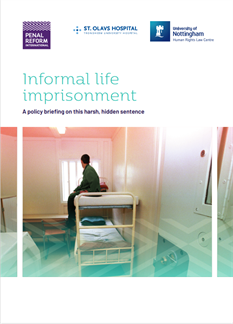Policy Briefings on Life Imprisonment
Life imprisonment is a severe sentence that, if it is used at all, should be imposed sparingly, implemented humanely and give people serving life sentences hope of release when they cease to pose a danger to society.
Life Imprisonment - A Policy Briefing
Our first policy briefing, produced with support from an ESRC Impact Accelerator Award, explores formal life imprisonment, ie where a sentencing court explicitly pronounces a sentence of imprisonment for life.
Between 2000 and 2014, there was an increase of almost 84 per cent in the number of people serving formal life sentences worldwide. However, since a 1994 United Nations report on life imprisonment, there has been little to no international assessment of the use of and issues surrounding life imprisonment, despite substantial developments in penal policy and practice.
This briefing examines formal life imprisonment worldwide. It draws on key findings from international research, and places them in the context of Goal 16 of the UN Sustainable Development Goals, which is ‘dedicated to the promotion of peaceful and inclusive societies for sustainable development, the provision of access to justice for all’, as well as the UN Standard Minimum Rules for the Treatment of Prisoners (Nelson Mandela Rules) and other relevant standards.
The briefing describes the different types, extent and practice of life imprisonment around the world. It provides recommendations for reforming life imprisonment to policymakers and practitioners. These include the abolition of life without parole sentences and the recommendation that life sentences should never be mandatory.
Read the briefing.

Informal Life Imprisonment - A Policy Briefing on this Harsh, Hidden Sentence
This second policy briefing, produced with support from the International Penal and Penitentiary Foundation (IPPF), explores informal life imprisonment, ie where the sentence imposed is not called life imprisonment, but where it may also result in the person being detained in prison for life.

Whilst attention has been given to formal life imprisonment, little is known about informal life sentences. Informal life imprisonment can be as harsh, and in some cases even harsher, than formal life imprisonment. Failure to examine the imposition and implementation of informal life sentences allows for a further class of harsh sanctions and their shortcomings to go unnoticed.
This briefing examines informal life imprisonment worldwide, drawing on findings from international research and placing them in the context of key international criminal justice and human rights standards. The briefing calls on policymakers and practitioners to reflect on informal life sentences and to include within them the more general constraints that should apply to the use of all forms of life imprisonment. It also provides specific recommendations on the imposition and implementation of informal life sentences.
Informal life sentences, if imposed, should be used as a last resort for the most serious crimes only, as they pose a key challenge to most criminal justice systems globally.
Read the briefing.